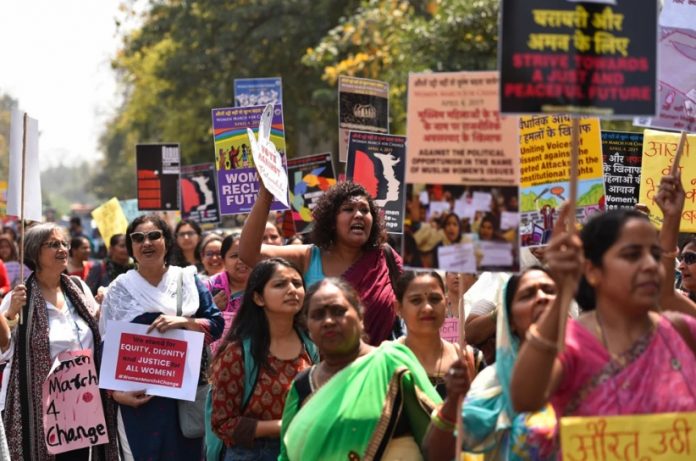ภายใต้ประมวลกฎหมายอาญาฉบับใหม่ของอินเดีย ผู้ชายที่หลอกลวงสัญญาการแต่งงานหลังจากมีเพศสัมพันธ์กับผู้หญิง อาจได้รับโทษจำคุกสูงสุด 10 ปี กฎหมายดังกล่าวซึ่งรัฐบาลของนายกรัฐมนตรี นเรนทรา โมดี นำมาใช้ในเดือนกรกฎาคม เพื่อใช้แทนประมวลกฎหมายอาญาที่มีมายาวนานถึง 164 ปี มุ่งเป้าไปที่เรื่องเพศโดยอาศัยคำสัญญาที่เป็นเท็จหรือวิธีการหลอกลวง เช่น ความก้าวหน้าทางอาชีพปลอม หรือการใช้ตัวตนที่เป็นเท็จ แม้ว่าจะมีเป้าหมายที่จะจัดการกับรูปแบบการล่วงละเมิดทางเพศที่พบบ่อยแต่มักถูกมองข้าม กฎหมายดังกล่าวได้จุดประกายความกังวลเกี่ยวกับการบังคับใช้ ประสิทธิผลในการปกป้องผู้หญิงจากการถูกแสวงหาผลประโยชน์ และศักยภาพในการทำให้การเลิกราเป็นอาชญากร ทัศนคติแบบอนุรักษ์นิยมของสังคมอินเดียต่อการมีเพศสัมพันธ์และการแต่งงาน รวมถึงการเน้นย้ำถึงความบริสุทธิ์ของสตรีและสินสอดที่มีราคาแพง ทำให้โอกาสของผู้หญิงในการแต่งงานมีความยุ่งยากขึ้น
ภายใต้ประมวลกฎหมายอาญาเก่า ศาลตัดสินว่าการมีส่วนร่วมในกิจกรรมทางเพศโดยอาศัยการหลอกลวงหรือคำสัญญาที่เป็นเท็จอาจส่งผลให้เกิดการตัดสินลงโทษในการข่มขืน แต่คำตัดสินเกี่ยวกับคดี “สัญญาว่าจะแต่งงาน” นั้นไม่สอดคล้องกัน ซึ่งกฎหมายใหม่พยายามจะแก้ไข ในปี 2562 ศาลฎีกาได้ปล่อยตัวชายคนหนึ่งที่ถูกกล่าวหาว่าข่มขืนหลังจากผิดสัญญาการแต่งงาน โดยอ้างว่าจะต้องให้สัญญาโดยไม่มีเจตนาที่จะปฏิบัติตามตั้งแต่ต้น ความสัมพันธ์ที่ต่อเนื่องของผู้หญิงคนดังกล่าวแม้จะมีอุปสรรคก็ถือว่าไม่เพียงพอสำหรับการตัดสินลงโทษในคดีข่มขืน แต่ในปีเดียวกันนั้น ศาลพิพากษายืนตามความผิดฐานข่มขืนแพทย์ที่ผิดสัญญาสมรส โดยพิพากษาจำคุก 10 ปี ผลลัพธ์ที่แตกต่างกันเหล่านี้เผยให้เห็นความสับสนในหมู่ผู้พิพากษา Tanvir Siddiki ผู้สนับสนุนด้านกฎหมายตั้งข้อสังเกต
กฎหมายใหม่แยกคดี “สัญญาว่าจะแต่งงาน” ออกจากคดีข่มขืน แต่ทนายความบางคนพบว่าขอบเขตคลุมเครือ ข้อกังวลรวมถึงการพิสูจน์การหลอกลวงและเจตนาในศาล โดยนักวิจารณ์ตั้งข้อสังเกตว่าการพิสูจน์เจตนาของบุคคลนั้นเป็นเรื่องยาก Gopal Krishna ผู้สนับสนุนทางกฎหมาย เน้นว่าผู้ถูกกล่าวหามักจะเปิดเผยความตั้งใจที่แท้จริงของตนเฉพาะกับคนสนิทเท่านั้น ไม่ใช่เหยื่อ ก่อนหน้านี้ เหยื่อการข่มขืนจะต้องเข้ารับการตรวจสุขภาพ ซึ่งข้อกำหนดดังกล่าวได้ถูกยกเลิกไปแล้ว และภาระในการพิสูจน์ก็ตกเป็นของเหยื่อ เยาวชนชาวอินเดียบางคนตั้งคำถามถึงความเกี่ยวข้องของกฎหมายในสังคมที่เปลี่ยนแปลงไป แม้จะกลัวการใช้ในทางที่ผิด Dmello จาก Majlis Law ยืนยันว่ากฎหมายดังกล่าวให้อำนาจแก่สตรีและส่งเสริมความเท่าเทียมกัน
The new law from India raises concerns about its implementation, effectiveness in protecting women, and potential criminalisation of break-ups.

Under India’s new criminal code, men who deceitfully break marriage promises after having sex with a woman could face up to 10 years in prison. The law, introduced by Prime Minister Narendra Modi’s government in July to replace the 164-year-old colonial-era penal code, targets sex based on false promises or deceitful means, such as fake career advancement or using a false identity. While aiming to address a common but often overlooked form of sexual abuse, the law has sparked concerns about its application, effectiveness in protecting women from exploitation, and the potential for criminalising break-ups. Indian society’s conservative attitudes towards sex and marriage, including strong emphasis on female virginity and costly dowries, complicate women’s prospects in securing marriages.
Under the old penal code, courts ruled that sex under false pretences could lead to rape convictions, but rulings on “promise to marry” cases were inconsistent, which the new law seeks to address. In 2019, the Supreme Court acquitted a man accused of rape after a failed marriage promise, citing that a promise must be made with no intention to fulfil it from the start. The woman’s continued relationship despite obstacles was deemed insufficient for a rape conviction. In contrast, the same year, the Court upheld a rape conviction for a doctor who broke a marriage promise, sentencing him to 10 years in prison. These differing outcomes reveal confusion among judges, noted legal advocate Tanvir Siddiki.
The new law differentiates “promise to marry” cases from rape, but some lawyers find its scope vague. Concerns include proving deceit and intent in court, with critics noting that proving a person’s intentions is difficult. Gopal Krishna, a legal advocate, highlighted that accused individuals often reveal their true intentions only to close confidants, not victims. Previously, rape victims had to undergo medical exams, a requirement now removed, shifting the burden of proof onto the victim. Some younger Indians question the law’s relevance in a changing society. Despite fears of misuse, Dmello from Majlis Law contends the law empowers women and promotes equality.
By CNN NEWS

















